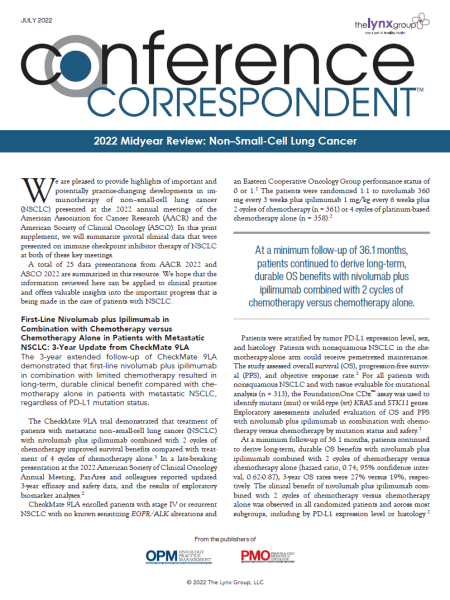Treatment was well tolerated and also associated with delayed progression in previously treated patients with NSCLC and METAmp/Ex14Δ.
Sym015 is a mixture of 2 antibodies that trigger MET degradation. The specificity of Sym015 is better compared with MET tyrosine kinase inhibitors (TKIs). Based on phase 1a trials, a phase 2 trial dose of 18 mg/kg on cycle 1 day 1, followed by 12 mg/kg twice weekly was tested. This study presents the results of a phase 2a trial that investigated the safety and efficacy of Sym015 in patients with MET amplification (METAmp) and/or MET exon 14 deletion (METEx14Δ) non–small-cell lung cancer (NSCLC).
Patients with NSCLC and either METEx14Δ (N = 12) or METAmp (N = 8) were enrolled in the trial. METAmp was defined as >5 MET copies by next-generation sequencing or MET/CEP7 ratio >2.2 updated to ≥3.0 by fluorescence in situ hybridization, and included 1 patient with METAmp+Ex14Δ. The status of the tumor MET mutations was confirmed centrally and monitored longitudinally by Guardant360 circulating tumor DNA analysis.
As of January 2020, 45 patients with a median age of 61.7 years were enrolled in the Sym015 trial. The median duration of exposure (DOE) was 3.8 months (range, 0.4-22 months). Treatment-emergent adverse events occurred in 93% of patients, and treatment-related adverse events in 42.2% of patients. Grade ≥3 treatment-related adverse events occurred in 13.3% of patients, with the most common being fatigue (13.3%) and peripheral edema (11.1%).
Among 20 patients with NSCLC, 5 had a partial response (PR; objective response rate [ORR], 25%; 2/8 METAmp and 3/12 METEx14Δ), 11 patients had stable disease (SD; disease control rate [DCR], 80%; 6/8 METAmp and 5/12 METEx14Δ), 2 patients had progressive disease (2/12 METEx14Δ), and 2 patients could not be evaluated. The patients with NSCLC who had not received MET TKI treatment (N = 10; 7 METAmp and 3 METEx14Δ) had an ORR of 50%, a DCR of 100% (5 patients with PR and 5 patients with SD; duration of response range, 1-18.3 months; DOE, 1.5-22 months), and a median progression-free survival (PFS) of 6.5 months (95% confidence interval [CI], 3.4-21.9 months). The patients who had received MET TKI treatment (N = 10; 1 METAmp+Ex14Δ and 9 METEx14Δ) had a DCR of 60% (SD, 6; DOE, 0.4-9.6 months) and a median PFS of 5.4 months (95% CI, 1.2-9.7 months). The overall median PFS was 5.5 months (95% CI, 3.5-9.7 months). Neither subgroup reached a median overall survival. Eight of 9 patients had a METEx14Δ tumor tissue to blood concordance.
Sym015 had a similar response rate to MET TKI in patients with NSCLC and METAmp/Ex14Δ who had not received previous MET treatments, and delayed progression in patients with NSCLC and METAmp/Ex14Δ who had received previous MET treatments. The authors noted that the treatments were well tolerated and that further studies should target dual treatment of Sym015 with MET TKIs.
Reference
Camidge DR, et al. J Clin Oncol. 2020;38(15 suppl):Abstract 9510.

